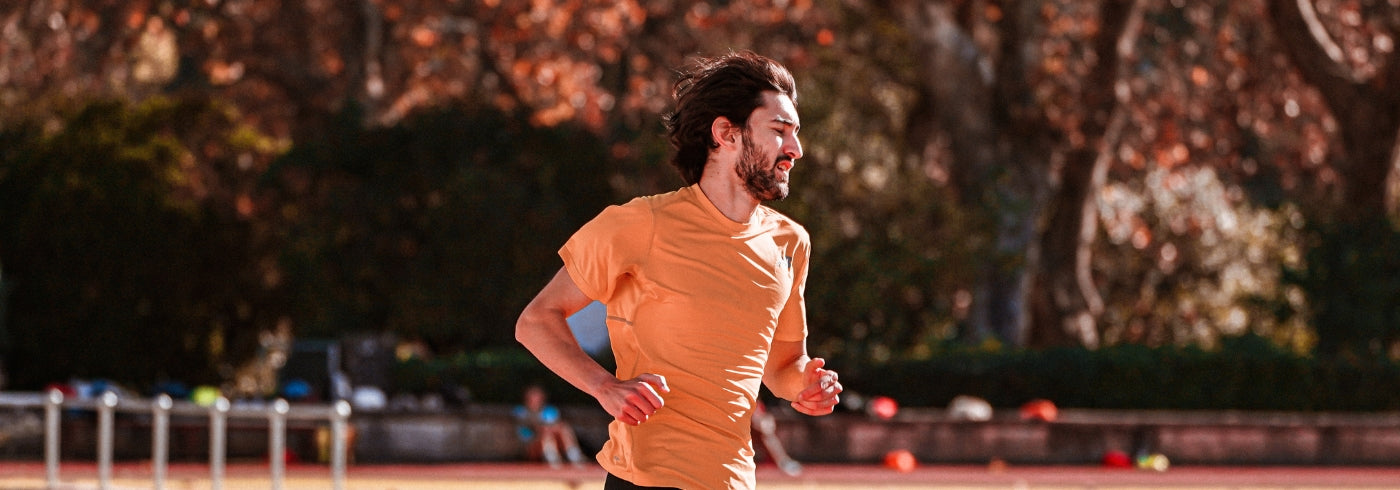
Warm Weather Training: The Benefits for Sprinters
BY DESTINY OGALI
As the weather begins to get warmer, this provides great opportunities for us as athletes to incorporate elements of our training that we had previously not been able to do due to the weather conditions.
Sprinters, in particular, rely on good weather to do specific speed sessions such as blocks where you're able to really hone in on your skills and make potential adjustments before the season starts. With the weather in the UK being very inconsistent, it is challenging to do said sessions during the winter when it's so cold due to the high injury risk. Many of the tracks freeze up due to the very low temperatures, which can cause an athlete to slip if they run on them with spikes. This contributes to why many athletes then opt to train abroad for a set time to get some specific training done without the limitations of the colder weather.
Choosing the right place and time for this training camp is essential. Some groups may spend more extended periods of time, whereas some may only go for a short while. Various factors can affect your decision-making depending on the level of your group, the age of your athletes and the cost of the training camp overall. These camps are brilliant to go on, but the price is always something you must consider before going. This, again, depends on where you are looking to go, what you want to be included alongside the training and how long you will be looking to go for.

WHAT IS WARM WEATHER TRAINING?
Warm weather training is a specific training programme carried out in a particular climate to benefit us as athletes.
You can choose various destinations depending on the time of year, how long you plan to go for and the number of athletes that will be going. Warm weather training is not exclusively available to top-level athletes but to any training group that intends to benefit from the weather conditions at their chosen destination.
This sort of training also prepares you for warmer conditions on race day. Many significant championships are held during the summer when the weather is warmer. Regularly training and functioning in those sorts of environments will benefit you in the long run as you compete in various competitions throughout the summer months.
For athletes wanting to compete during the indoor season, getting some quality speed & block sessions is necessary before racing. With that in mind, many groups and coaches will opt for a warm-weather training camp to have specific sessions done in preparation for competition upon their returning afterwards. Planning the trip in accordance with your season is crucial as you want the camp to fit in with your schedule. Having the camp too close to competition or late into the season could cause issues.

IS WARM WEATHER TRAINING GOOD FOR SPRINTERS?
Yes, I would say so. Having only gone away on warm weather training for the first time this year, I can say it was a truly fantastic experience for me.
Being able to train in a competitive environment with other like-minded athletes and experience being in a different country doing the sport you love is fantastic. The weather is excellent because it enables you to train however you desire without any limitations due to the climate. Depending on how long you are there, you can plan your sessions accordingly to work on whatever you feel you could not do whilst back home due to the poor weather conditions.
As mentioned above, it's also excellent preparation for the season ahead. This is exactly what you will expect for major competitions such as European Juniors or World Juniors and the Senior major races. Travelling abroad and having to train and compete in a different country is part of what makes up competing at high-level competitions. Being in that environment enables you to go through the process of adjusting to your surroundings.
If you ever get the opportunity to go, I would definitely suggest going. There's a lot you can learn about yourself whilst you're there, even if it's small things like how long it takes you to acclimatise, certain foods you don't like or how little/much warmup you need in warmer climates. This information could be helpful for you and your coach in the future.

WHAT IS THE POINT OF WARM WEATHER TRAINING?
Each training group may have different reasons and objectives for why they choose to go on warm weather training.
I went because I wanted to experience going abroad and running in the warmer weather. After all, it stimulates what it will be like for me to go away to race during the summer at Europeans. Being in a competitive training environment where everyone wants to improve and better prepare themselves for the season was really enjoyable. I was constantly around other athletes from whom I could gain helpful knowledge and who understood what I was doing.
It was fantastic to learn so much while I was abroad. It allows an individual sport to feel more like a team event when you're together in the same place. It's a very similar experience to what it's like when you go to English Schools, for example, in the sense that you are all together the entire time and are under one umbrella moving towards a common goal. Overall, the point is to put yourself in a better training environment to get some specific high-quality sessions done in good weather conditions.

TRAINING IN HOT VS COLD WEATHER
I don't really mind the weather I train in as long as it's not dangerous or pouring down with rain or snow!
I can better understand what a proper warmup does when it's cold in the winter. Your muscles will be pretty tight, but as you begin your warmup routine, you can feel the gradual process of your muscles lengthening and getting warmer. I enjoy that process. In the summer, however, it's the opposite for me. It's a case of shortening the warmup as the muscles are already warm. Overdoing it will only cause you to fatigue.
As a sprinter, I know it isn't possible to do proper speed sessions in the winter, as the track will be too hard due to the frost from the cold temperatures. This can pose an issue, but adapting and adjusting to suit is vital to ensure you get what you need regardless of the weather. Athletes with an indoor training facility can come inside and train freely without the harshness of the weather. This, of course, isn't available to everyone, unfortunately.
I would definitely say it's better for specific quality sessions in the summer. You can do much more without limitation as opposed to the winter, where there are some sessions you can't do due to the risk of injury. Regarding which is better overall, I would say a mix of both. Being able to perform under both conditions consistently bodes well for a race day where you could be running in either of those conditions. Weather is something we can't control, but we can control how we respond to it. Refraining from overreacting to the weather is a great place to be in, as regardless of the conditions, the distances you will be running stay the same. The experience itself may not be quite as pleasant, but at the very least you know that your event will still be your event on any given day.

IS IT HARDER FOR SPRINTERS TO TRAIN IN HOT WEATHER?
For me, training and running in hot weather is really fun. However, as high temperatures inevitably cause you to sweat a lot, you must ensure you're taking care of your body.
When you sweat, you lose a lot of water from your body, so it's imperative to stay hydrated when training to avoid any fatigue or health issues. For some, training in hot weather is an unpleasant experience as the sun can cause people to become more fatigued as the session progresses. The studies show that endurance workouts are more difficult to perform than sprint workouts.
So overall, it depends on who you are and how your body works. I wouldn't say it's harder, but you can feel more of the effect of the environment compared to when it's cold. In the cold, when you've warmed up, it's not so bad, and even if you begin to get cold, once you start running again, you won't feel it as much. Either way, running in any weather condition will be helpful as you never know what you will get on race day. Being prepared for almost all types of weather will greatly benefit you as the athlete knowing you have run in those conditions before.
To summarise, be prepared for anything. The weather constantly changes, and it isn't something we can control. Going away and training is a great experience I suggest people do if they ever get the opportunity. If it's cold, please warm up properly to avoid injury, and if it's hot, please wear sunscreen and stay hydrated! Both conditions require some care to ensure you're healthy and ready to run. As always, have fun and enjoy your athletics. If you ever have questions, please do reach out!
ABOUT DESTINY OGALI

Destiny is a sprinting athlete who competes for Harrow AC, and he is incredibly passionate about helping other sprinters and athletes go further in their athletic journeys!
He already has experience in discussing athletics topics with others through The Visions Podcast, where he has sat down and spoken with some great athletes, including Desiree Henry and Aidan Syers!
You can find Destiny's sprint performances on his Power of 10 profile.
Instagram: @destinyogali & @thevisionspod


Leave a comment